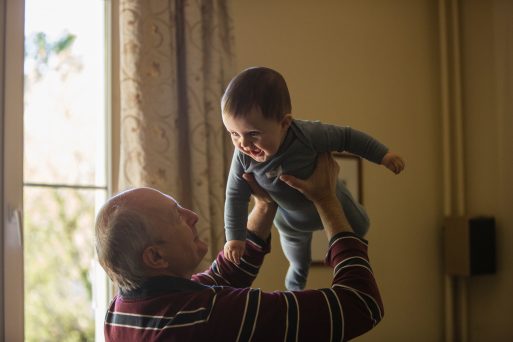
Grandparents love visiting grandchildren, especially during the holidays
It’s been said a grandparent is a child’s link to the past and the grandchild is the grandparent’s link to the future. The results of a German study published this year indicates the future they share may be longer if a grandparent steps in to give moms and dads a break from the little ones. Granted, grandma and grandpa may feel extra tired after the grandkids head back home. But science has uncovered a reward for that effort: Grandparents who babysit live longer.
The Berlin Aging Study (BASE) found that grandparents who babysit or provide some level of care to their grandkids had lower risks of death over a 20-year period than older adults who did not take on caregiving roles. That’s according to data that tracked the health outcomes of more than 500 people, ages 70 and older, who are associated with the Berlin Aging Study group.
The BASE, a multidisciplinary investigation of old people aged 70 to over 100 years who live in the former West Berlin, began its first study (1990–1993) with a core sample of 516 individuals who were closely examined in 14 sessions covering their mental and physical health, their psychological functioning, and their social and economic situation. Since then, the study has been continued as a longitudinal study, and surviving participants have been reexamined seven times. The goal of this latest study focusing on grandparents who babysit was to understand the differences between grandparents who babysit, those who never did, and those who were not grandparents, but provided care for others within their social network.
Half of the grandparent study group were alive 10 years after the initial interview in 1990. Meanwhile, half of the older people who did not provide help for a child had passed away five years post-interview. Along with the finding that grandparents who babysit live longer, came the finding that any older person who assists in the care of children is likely to live about three years longer than those who do not.
The BASE study adds to a growing body of research that indicates the elderly who help raise young children benefit, with possible positive effects on cognitive function and well-being. The researchers have concluded, “All helper groups – grandparents who gave care to their grandchildren; parents who provided instrumental help to adult children; and childless participants who helped others in their social network – had higher survival probabilities than the respective non-helper group.”
Sounds like a win-win-win. We’ve long known grandparents are key to a child’s development. These recent studies verify elders and grandparents who babysit live longer. And there’s really no need for a study to ascertain that caregiving help from elders is a “life-saver” for parents as well.

 Grandparents Who Babysit Live Longer
Grandparents Who Babysit Live Longer



 How Dare You Die Now!
How Dare You Die Now!
 Debating Medical Aid in Dying
Debating Medical Aid in Dying
 “Help Me, Helen”
“Help Me, Helen”














